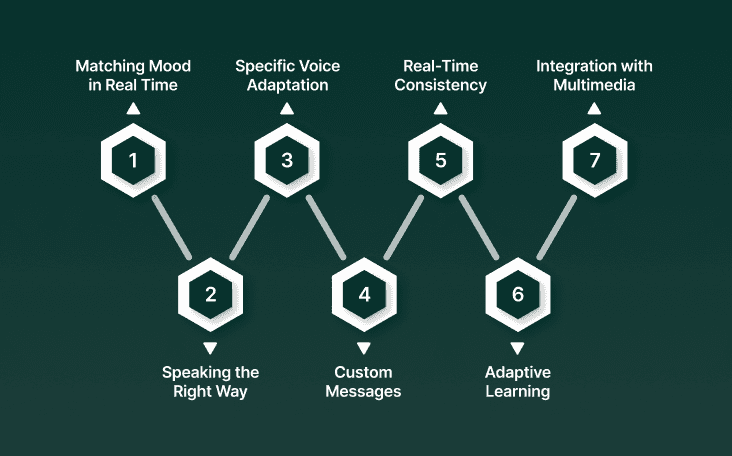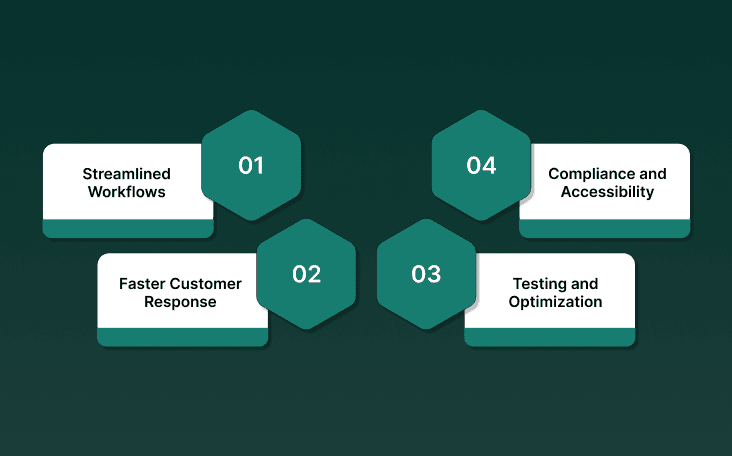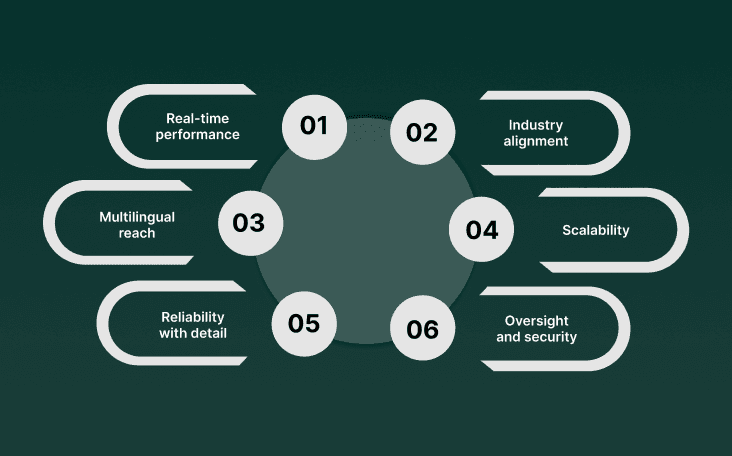Discover the benefits of using AI agents for brand voice to ensure consistent, personalized messaging across channels. Learn more now!

Akshat Mandloi
Updated on
December 26, 2025 at 11:28 AM
Customer trust often depends on something as subtle as tone. Research shows 71% of people now expect personalization, while 76% feel frustrated when companies miss the mark.
AI agents are increasingly used in marketing to shape those interactions. They adjust messaging in real time, ensuring communication stays aligned with audience expectations.
Brand voice sits at the heart of this effort. A clear, consistent style makes a company recognizable, builds loyalty, and can even drive higher spending when experiences feel seamless.
This article explores how AI agents create opportunities and address challenges in maintaining a consistent brand voice across communications.
Key Takeaways
AI agents help brands maintain a consistent voice across channels while adapting messages to context, mood, and audience.
They enable personalization at scale, making customer interactions feel more human and engaging.
Consistency, speed, and efficiency improve workflows, reduce errors, and support testing and optimization of messaging.
Human oversight remains essential to handle creative, strategic, and nuanced communication that AI alone can’t fully manage.
Understanding AI Agents and Their Role in Communication
AI agents are software that can understand input and respond like a human. They include chatbots, voice assistants, and digital assistants that guide users or answer questions. These AI tools in customer support engage customers across websites, social media, email, and messaging apps, adapting their responses based on context.
For example, a retail chatbot can suggest products, a banking assistant can complete transactions by voice, and a support AI can handle common questions instantly.
These interactions demonstrate that AI agents do more than just automate responses. Maintaining a consistent voice across all touchpoints is what turns these automated interactions into meaningful experiences.
The Importance of Brand Voice
Brand voice is the consistent style, tone, and language a company uses to communicate with its audience. It shapes how people perceive the brand, influencing whether they see it as trustworthy, approachable, or professional.
Ensuring this consistency presents several challenges:
Across multiple channels, departments, or global teams.
Messages can unintentionally vary, reducing brand recognition.
Inconsistency can weaken the overall brand identity.
A clear, steady brand voice directly affects engagement, loyalty, and trust. Consistent messaging makes content more memorable, encourages repeat interactions, and strengthens emotional connections with customers, increasing the likelihood of long-term relationships.
Also Read: How Conversational AI Is Transforming Customer Engagement and Business Automation
Given these challenges, AI assistants for business can help brands maintain a consistent voice across all interactions, adapting messages in real time while preserving tone and style.
How AI Agents Adapt Brand Voice

AI agents shape every interaction. From adjusting tone to personalizing messages and keeping content aligned across platforms, they ensure the voice stays true no matter the channel or audience.
Here’s a closer look at how these agents adapt brand voice in practice.
1. Matching Mood in Real Time
AI agents can sense the emotion behind a message. If a customer sounds frustrated, the agent softens the response with empathy. If someone is excited or curious, the reply becomes upbeat. This keeps the brand sounding human and aware, not robotic.
2. Speaking the Right Way for the Moment
The same brand can talk differently depending on the situation. A finance app may use precise language for account alerts, but a lighter, friendlier tone for promotions. AI ensures every message fits the context without losing the brand’s personality.
3. Channel-Specific Voice Adaptation
Every platform has its own communication norms. AI agents automatically adjust content to suit chat, email, social media, or voice interactions. Tweets stay concise and catchy, emails remain professional, and voice responses sound natural, all without losing consistency.
4. Custom Messages for Different People
AI can subtly shift phrasing depending on who’s reading. First-time users get clear, simple guidance, while loyal customers might receive more detailed or playful messaging. It’s like having a conversation that feels personal, even at scale.
5. Real-Time Consistency Checks
AI agents continuously compare outgoing messages against brand guidelines. This reduces human error, ensuring that language, style, and tone do not drift even across large-scale campaigns or multiple departments.
6. Adaptive Learning from Interactions
AI remembers what works. If a certain style or wording increases engagement, it uses that in future interactions. Over time, the brand voice becomes sharper and more effective, without anyone having to micromanage every word.
7. Integration with Multimedia Content
Brand voice isn’t just written words. AI can shape scripts for videos, voice assistants, and interactive content, so the tone feels the same whether a customer is reading, listening, or watching.
Also Read: How AI Voice Agents Are Transforming Communication in Logistics Operations
By adapting messages on the fly and learning from each interaction, AI agents turn brand voice into a living, evolving asset. Next, let’s look at the specific advantages brands gain from using AI agents for voice.
Key Benefits of Using AI Agents for Brand Voice

Beyond maintaining tone or personalization, AI agents bring practical operational benefits for brand teams. They reduce repetitive workload, improve responsiveness, and support controlled testing of messages while ensuring compliance and accessibility.
Here’s a closer look at these advantages in action:
Streamlined Workflows: AI handles routine messaging tasks, freeing teams to focus on strategy.
Faster Customer Response: Agents provide immediate answers, preventing frustration and keeping engagement high.
Testing and Optimization: Quickly trial message variations to refine campaigns without risking brand alignment.
Compliance and Accessibility: Messages can automatically meet legal, regional, and accessibility standards.
While these benefits make AI agents valuable tools in brand communication, they are not without limitations. Understanding the challenges ensures brands use AI effectively without compromising voice or audience trust.
Challenges in Using AI for Brand Voice
Even with advanced AI, relying solely on software can create blind spots. Agents may follow rules perfectly but still fail to understand subtler cultural or emotional cues in messaging.
Oversight is required to ensure that communications reflect broader strategic goals. For example, aligning campaigns with seasonal campaigns, promotions, or shifting brand priorities often requires human judgment.
AI also struggles with highly creative or unconventional messaging. Bold campaigns, humor that pushes boundaries, or storytelling that requires deep empathy often still need human ingenuity to truly resonate. Below is a summary of the main challenges and why they matter:
Challenge | Why It Matters |
|---|---|
Subtlety Gaps | Cultural, emotional, or situational nuances can be missed |
Strategic Alignment | Campaign priorities may require human adjustments |
Creativity Constraints | Bold or highly imaginative content often needs human input |
Combining AI with human insight ensures brands maintain authenticity and strategic coherence while still benefiting from AI-driven efficiency.
Also Read: How Voice AI Platforms Are Reducing Contact Center Expenses
Addressing these challenges requires solutions that combine AI efficiency with human oversight. Enterprise tools like Smallest.ai offer a way to maintain voice consistency while managing subtlety, strategic alignment, and creative demands.
Enterprise Voice Consistency with Smallest.ai
Enterprises need voice AI agents that combine accuracy, security, and scale. Smallest.ai delivers custom-trained agents with reliability guarantees, built to handle thousands of daily calls. They manage complex cases, numbers, and multilingual interactions while integrating through SDKs and dashboards.
With cloud or on-premises deployment, Smallest.ai adapts to enterprise infrastructure. Its SOC 2 Type II, HIPAA, and PCI compliance gives industries like banking, healthcare, and real estate confidence. This ensures their brand voice stays consistent and trustworthy in every interaction.
OR
Enterprises that serve customers across industries like finance, healthcare, and real estate face a key challenge: keeping communication accurate, consistent, and compliant at scale. This is where Smallest.ai strengthens brand voice delivery with its enterprise-grade voice AI agents.
Here’s how Smallest.ai supports brand voice adaptation:

Real-time performance: Voice models operate under 100 ms latency, enabling natural, uninterrupted conversations.
Industry alignment: Agents are trained on enterprise data with robustness guarantees, ensuring compliance in regulated fields.
Multilingual reach: Support for over 16 languages allows consistent brand tone across regions and customer bases.
Scalability: Agents can handle thousands of calls per day, managing parallel conversations without loss of quality.
Reliability with detail: Built to handle corner cases and numeric precision, such as credit card or phone numbers.
Oversight and security: Custom dashboards provide detailed call insights, while deployments meet SOC 2 Type II, HIPAA, and PCI standards.
By combining speed, multilingual capability, and enterprise security, Smallest.ai enables organizations to maintain brand trust while adapting voice interactions to diverse audiences.
Conclusion
AI agents help brands maintain consistent messaging, deliver personalized experiences, and scale communications efficiently. When guided by human oversight, they strengthen trust and engagement without losing the brand’s unique identity.
Balancing AI with strategic direction allows teams to preserve creativity while benefiting from speed, accuracy, and consistency. Brands that adopt AI thoughtfully can enhance recognition, loyalty, and overall impact.
Smallest.ai’s AI voice agents make it possible to keep messaging aligned, adapt interactions for diverse audiences, and ensure every touchpoint reflects the brand’s identity.
Experience seamless brand communication - book a demo with Smallest.ai today!
Explore how Smallest.ai’s AI voice agents can streamline your brand communication.
FAQs
1. Can AI agents help with multilingual brand communication?
Yes. AI agents can generate messages in multiple languages while keeping tone and style consistent, helping global brands engage diverse audiences without losing their voice.
2. How do AI agents measure the effectiveness of brand messaging?
AI systems typically track engagement metrics like click-through rates, response times, or sentiment analysis, giving insights on how well messages resonate with different audience segments.
3. Are AI agents suitable for small businesses or only enterprises?
AI agents can scale to fit any business size. Small businesses can automate customer replies or social engagement, while enterprises manage high-volume interactions, all while maintaining a consistent voice.
4. How can businesses keep their brand voice consistent across platforms?
Enterprise-grade AI voice agents, like those from Smallest.ai, help maintain consistent messaging across calls, chat, and digital channels, adapting to context while staying on-brand.
5. How do AI agents support customer onboarding or education?
AI agents can guide new users through tutorials, product explanations, or FAQs, delivering clear, on-brand instructions that improve understanding and adoption.


